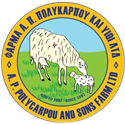The village existed under the same name during Medieval times. It is found marked in old maps as “prastio” but also as “prasmo”. Leontios Machairas mentions the village, referring to it as “Prastio of Avdimou”, as the venue where the Mamluks arrived in 1426. However, it is possible that he meant another coastal venue -south of Avdimou -where the invaders disembarked Avdimou, therefore, must have more than one “prastia” (plural of “prastio) in that era. Besides, the name of the village relates to the Byzantine times. Some researchers claim that the name “Prastio” comes from the French Medieval word “Prasti”, which means “field”. That is, it was a place-name for farms/ranches that belonged to certain Feuds. The name, however, seems to be purely Greek and -indeed -of the Byzantine times, coming from the word “proastion” that means “settlement near the city” (pros to asti).
During the Medieval times, many small settlements -in various regions of Cyprus -were named “Prastio”, in the sense of small, agricultural settlements close to large settlements to which they belonged to.
The village’s Turkish inhabitants were calling it “Yuvali”, which means nest. During the Turkish domination era, the village came under the administrative jurisdiction of Avdimou’s Cadi (Turkish judge). The village also came under Avdimou during the period of the Frank domination and -perhaps -even before, during the Byzantine years.
